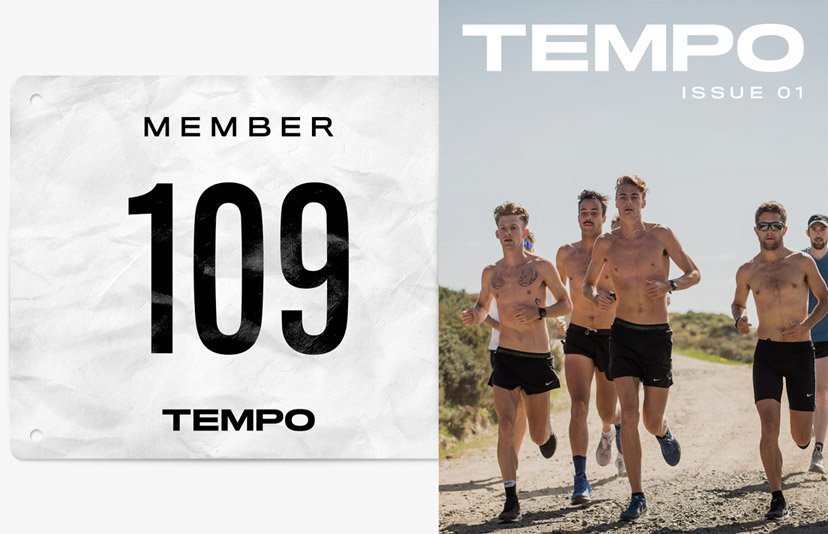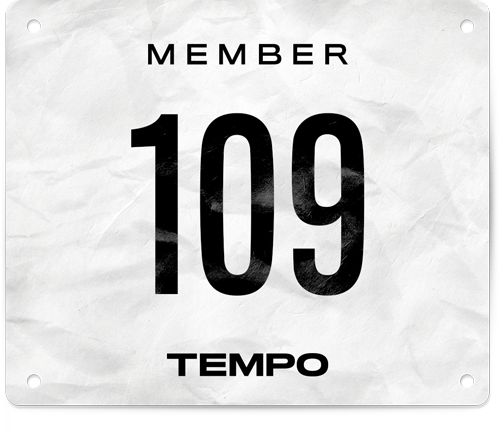Culture
Creating Common Ground
A Chat Between Patrick Monti (MEL) and Tim Rossi (NYC)
Tim Rossi and Patrick Monti are two accomplished runners who have more in common than just their passion for the sport. Both are dedicated sub-elite competitors striving to break the elusive 2:30 barrier in the marathon. Both have PRs of 2:31-and-change. They both also work in creative roles within the running industry – Tim as the head of brand and experiential marketing for New York label Bandit and Patrick as the co-founder of Up There Athletics, a boutique running store in Melbourne, Australia. And they happen to be the same age, both being born in 1992.
Tempo brought them together for a conversation about chasing big goals, staying motivated through setbacks, and balancing their professional lives and family commitments with competitive running.
Tempo: Can you give us a brief rundown of your running backgrounds and progression towards your current marathon goals?
Patrick: I grew up playing other sports but had no interest in running whatsoever. My eldest sister and I were both pretty decent at swimming, so school swimming carnival day was fine but on athletics carnivals I used to try anything I could to get out of it. Same with cross country – it just wasn't my thing. And then I left school and was playing footy, AFL, down here in Melbourne, plus cricket and whatnot, and then I sort of fell into running. I would run sporadically. I had a 10K loop around home and I'd just hammer that over and over again. In hindsight, looking at my times, I was probably chasing something even then, without knowing it.
“You're running, but why? For me, I can delineate between the performance side of things and the running for health and wellbeing side of things.”
Patrick Monti
But I started running seriously in 2018 when someone connected me with the New York City Marathon. His mum was a really close family friend who had died from multiple myeloma, a type of blood cancer. We got chatting and he got me to run the marathon under a fundraising bib for a cancer foundation. I went in pretty blind, with no time expectations, and ran 3:30. From there, I just got more and more into it, going 3:31, 2:47, 2:35, a DNF and then 2:31:40 – my current PR from London last year – before ticking up to 2:32:14 earlier this year.
Tim: Similar story for me. I started running recreationally in college and ran my first marathon in 2014 in 2:49. I gradually chipped away at my times, going from that 2:49 to 2:46, then 2:31:19 at NYC in 2018, which remains my PR. I thought I'd just keep knocking out PRs indefinitely, but it's been a humbling six years since then!
I don't think I've ever shared this backstory, but my dad ran the New York Marathon when I was a kid. And he is not a runner; he is, in the nicest way possible, a large old man who is not the healthiest in the world. And he did not let our family forget that he ran 3:01. So when I ran my first marathon, that was my framing. I was like, 'If I don't beat this time, I'm never gonna hear the end of it.' So that led to me running NYC in 2018, and I have not run faster since then, which is a bit of a bummer, but hopefully we're getting there.
“I know people will still be stoked regardless of whether I run 2:55 or 2:32. It's all self-inflicted pressure, in a good way. I want to achieve those things for myself, not for anyone else.”
Tim Rossi
Tempo: It's cool to think you were both out there on the NYC course in 2018, Pat in his debut and Tim unknowingly setting this PR he's still trying to best.
Tim: I feel like that happens a lot within the running world. You don't know of people but you put the connection together later, sometimes years later. I was talking to a guy from Maurten here in the US because he was involved in the book. We were going down the laundry list: 'Oh yeah, you were there, you were there. Like, no way!'
Tempo: You've both visited and ran in each other's cities. How do you think the respective geographies or cultural differences shape running where you are?
Patrick: It's interesting in Australia, and in Melbourne in particular, because we're so isolated that I don't think we have as much spread in that sub-elite range that you guys have. In New York, you might have your 2:14 guys to your 2:20 guys. Here in Melbourne, you've probably got your 2:30s to your 2:20s, and then there's your elites. I feel like at the top end there's a section missing, and you only realise that when you go from Australia to an international marathon. Then you get a real idea of the depth and how your 2:31 is like some one other guy's Sunday long run! It's obviously incredibly humbling but it puts everything into perspective, which is harder to get down here just due to having fewer races and where we are in the world, and the depth of races.
“It's interesting in Australia, and in Melbourne in particular, because we're so isolated that I don't think we have as much spread in that sub-elite range that you guys have [in New York].”
Patrick Monti
Tim: Pat, how do you think the marathon scene down there is changing right now? In my mind, within the context of Sydney striving to become a major, I continuously hear about all the races that are happening in Australia and it seems amazing!
Patrick: Obviously Sydney is a massive one. And Melbourne has been steadily growing over the last few years, post-COVID. And this year we had the first Ballarat Marathon, which is in a country town in Victoria, outside of Melbourne. From all reports, it was a massive success, and it's at a good time because it's at the end of April, when there's nothing much on the race calendar around that time. You're either going to Europe or you're going to Japan. So it's cool to have something on the calendar locally to build up to, then build to Gold Coast and, later in the year, Sydney or Melbourne. And the Sydney thing will be huge – and from from all reports, it's a when not an if. Sydney's so iconic as a city and, being a major, it would attract so many people.
Tempo: Changing tack slightly, how do you stay motivated to chase such an ambitious goal as 2:30, especially when facing setbacks or 'failures' along the way?
Tim: It's about truly believing that sub-2:30 is possible, even after disappointments like my recent Boston Marathon. It would be easy to cop out and go jog a marathon, and that'd be fun – I'd have a blast – but I still believe in being as fast as I personally can. Pursuing that is fun and worthwhile, win or lose. It does have an ebb and flow. Right now, after Boston, I've been asking myself if I want to run a marathon in the immediate future.
But I know I'll do it again. And while I don't need external validation – it's an internal drive to see what I'm capable of – the running community helps, too. Seeing my friends chase down their goals is inspiring and relatable, even if their exact times are different from mine.
I also know that people will still be stoked regardless of whether I run 2:55 or 2:32. It's all self-inflicted pressure, in a good way. I want to achieve those things for myself, not for anyone else, because no one really gives a shit in the end – in the nicest way possible.
Patrick: This gets asked a lot on running podcasts and in the community: you're running, but why? For me, I can delineate between the performance side of things and the running for health and wellbeing side of things. I'm a much better person when I do run, from a mental health point of view. I think that it's done wonders for me in that regard. Not that it changed my life, but – during my early to mid-twenties – it changed my priorities. You know, a lot less partying, all that sort of stuff. It changes what you're getting up for in the morning.
It's almost like that's the foundation and then the racing is on top of that. So if I strip away the racing and the time goals, that underlying motivation and that foundation of health, wellbeing and mental health is still there, which at the end of the day is far more important than the racing aspect anyway.
I also agree on the community aspect. On a micro-level, I rely on my partner Phoebe and my mates to get me out the door consistently. Seeing other people's successes and the unbridled joy they get from running – that really motivates me too.
And in fairness to Tim, I don't think I've had a truly awful marathon. I mean, I had a DNF a couple of years ago in the Gold Coast and it was bad, but I haven't had a really terrible, terrible experience. So I haven't had to grapple with that yet – like where's the next motivation coming from?
“It would be easy to cop out and go jog a marathon, and that'd be fun – I'd have a blast – but I still believe in being as fast as I personally can.”
Tim Rossi
Tempo: As running-industry professionals, how do you navigate the intersection between your work and your own training and racing?
Tim: I actually like having that overlap, even if it occasionally leads to tricky situations like juggling the Boston Marathon with Bandit's events that same weekend. Overall, it allows me to stay immersed in the sport that has shaped so much of my life and identity. I get to interact with the running community in a meaningful way and hopefully inspire others, just like I was inspired by runners I looked up to when I was getting started.
Patrick: I'm in the same boat. The positives definitely outweigh the negatives. Even though I've done what many people tell you not to do, which is to monetise your hobby by making it into your work life. Sure, there are times when work commitments mean putting your own running goals on the backburner, but it's incredibly rewarding to be part of this community and help others fall in love with the sport. The relationships, experiences and even the perks like race entries that come with working in running are something I'm very grateful for. It just takes some flexibility and boundary-setting to make it all work.
“The positives definitely outweigh the negatives. Even though I've done what many people tell you not to do, which is to monetise your hobby by making it into your work life.”
Patrick Monti
Tempo: What are your current training approaches? What have you found works well as you aim to get from the 2:31-plus range down to sub-2:30?
Patrick: I'm naturally a creature of habit, so I've always relied heavily on consistency and routine. For me, that means early morning runs before work and really nailing the 'one-percenters' like strength training, recovery and lifestyle choices. As the goal times get more ambitious, I think it's all about accumulating those marginal gains and figuring out the specific training formula that works for your body.
Tim: Definitely. I've learned that I need to prioritise sleep and that doubles don't agree with me, so I stack my training early in the day. I've also been doing more quality long runs and working with a coach for outside perspective. But it's an ongoing process of experimentation and I think every marathon block teaches you something new about yourself. Sometimes you overdo it; other times you find a new stimulus that really works.


